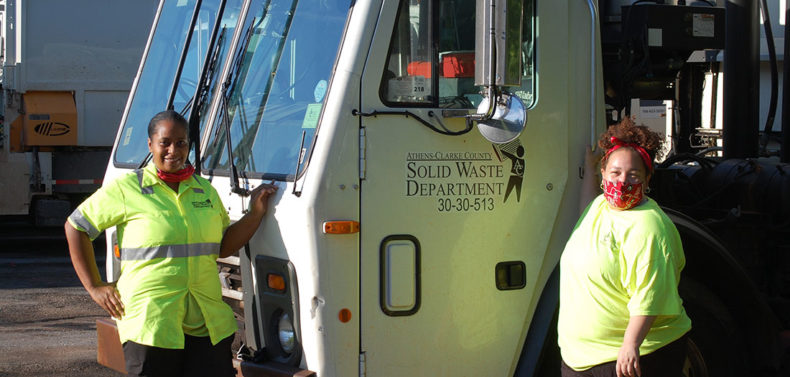Takisha Mapp, Miah Love and Beverley Gresham worked alongside each other at the Clarke County School District transportation department before they traded in their clean shirts and blue jeans for their now oil-stained, bright-yellow, high-visibility shirts.
In August 2018, Mapp was hired as Athens-Clarke County Solid Waste’s first female trash-truck driver. Solid Waste’s collections division has always been a male-dominated field.
“I don’t think women get encouraged to go for their commercial driver’s license or even work in the solid waste industry for that matter,” says Solid Waste Director Suki Janssen.
“We would post it just like any other job, and there just would not be any female applicants,” adds Collections Administrator Korey Jones.
Mapp says she has not felt any pressure from her male co-workers as the first woman in her role. “I never really thought of myself as the first. When I applied, something told me this would be my job,” she says. “A lot of people downed me, but I just see it as a job, and anybody can do it.”
“I don’t know if she felt as awkward as maybe the men around her,” Janssen says. “I think Takisha’s personality is so loving and sweet that she’s going to fit in anywhere.”
Coming into Solid Waste, Mapp felt welcomed with open arms. “It’s like a family here, so I didn’t feel uncomfortable,” she says. “It was stressful learning everything and trying to keep up the pace, but I’m trying to do my best and be the best I can be,” she said.
In May 2019, Love joined Solid Waste and became the second female driver. Gresham became the third female driver in June 2019.
When she was a child, Gresham’s father introduced her to trucks, since he was a driver. While she enjoyed trucks, she initially did not want to drive. “I only learned how to drive because I went to Savannah State and wanted to know how to drive before I left,” she says.
Already used to working in male-dominated fields, Gresham found herself at home at Solid Waste. She had previously worked as a driver for Athens Transit and Clarke County School District and drove 18-wheelers before that. Gresham found it easy to learn to operate garbage trucks.
Being mothers, each of the three appreciates being able to see their children off in the morning and pick them up after school, without their work schedules interfering. “We didn’t have much time for our kids,” Mapp says about her last job. “I would do the school bus route in the morning, hurry up and go work transit for a few hours, run back to the school bus, and then go back to transit at night and get off at 10:30.”
“With this job, I get to spend a lot of time with my kids, and I don’t have to stress about how to get them, how they’re getting home or who’s going to watch them,” Gresham says.
Love had a baby recently and is the first in collections to be on maternity leave. “This is all new to us, but we are rolling on in her absence, and hopefully she’ll be back soon. We miss her,” Jones says.
“For a lot of men, they have their wives or their kids’ mom that can take them to the doctor and other things, so they don’t have to take off of work,” Love says. “Trying to find a balance has been hard for me, because I have to take off days to do things for my older children, and now with a newborn, I have to take even more days off.”
Working as a driver comes with its challenges. Drivers can have over 800 trash cans to pick up in a day, and often have to get out to grab cans, move them and retrieve debris or cardboard. Drivers sit next to a hot engine with only a small fan on hot days, getting jostled around for hours by the truck’s power and size. They are sometimes set back hours when trucks break down, and they get little recognition for their hard work.
“Cleaning the back end behind the compactor blade is not fun,” Janssen says. “Garbage juice comes out. It’s smelly, and it’s going to get on you no matter what you do.”
Mapp says that she has respect for those who do show their appreciation. “Throughout the week, we have people give us water, Gatorade and snacks. Some people you don’t meet until the holidays, and they give you gifts,” she says. “There are little kids that wait on you, and you get to interact with them, and dogs also wait for you to come.”
All three women have done a great job, according to their bosses. “I think they’re more receptive to their job duties and tasks than their other co-workers can be. I ask them to do something, and they get it done with no questions or complaints,” Jones says. “All three of them are go-getters. They do their routes, then get lunch, instead of stopping in the middle and going like some crews.”
“I think it’s just become our time,” says Janssen. “I think women are getting better about fighting for their value. We’ve been OK just being hired. I think now, what we’re going to start seeing is, ‘No, we’re not OK with just being hired.’”
Daveon Montgomery wrote this article while a senior at Cedar Shoals, working with Solid Waste through their Great Promise Partnership. He is off to Howard University in the fall.
Like what you just read? Support Flagpole by making a donation today. Every dollar you give helps fund our ongoing mission to provide Athens with quality, independent journalism.






